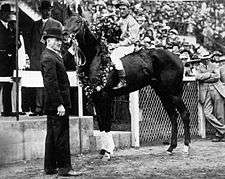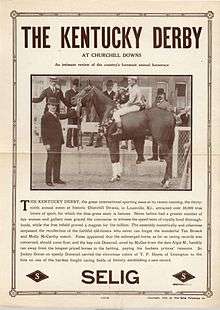1913 Kentucky Derby
The 1913 Kentucky Derby was the 39th running of the Kentucky Derby. The race took place on May 10, 1913.[1] Horses Prince Hermis, Sam Hirsch, Flying Tom, and Floral Park scratched before the race. The winning time of 2.04.80 set a new Derby record.[2] With odds of 91–1, winning horse Donerail is the longest odds winner in Kentucky Derby history.[3]
| Kentucky Derby | |
| Grade I stakes race | |
 Donerail after winning the 1913 Kentucky Derby | |
| Location | Churchill Downs |
|---|---|
| Date | May 10, 1913 |
| Winning horse | Donerail |
| Jockey | Roscoe Goose |
| Trainer | Thomas P. Hayes |
| Owner | Thomas P. Hayes |
| Surface | Dirt |
Full results
| Finished | Post | Horse | Jockey | Trainer | Owner | Time / behind |
|---|---|---|---|---|---|---|
| 1st | 5 | Donerail | Roscoe Goose | Thomas P. Hayes | Thomas P. Hayes | 2:04.80 |
| 2nd | 4 | Ten Point | Merritt C. Buxton | Calvin Banks | Anthony L. Aste | 1⁄2 |
| 3rd | 3 | Gowell | John McCabe | John T. Weaver | John T. Weaver | 1 1⁄2 |
| 4th | 8 | Foundation | Johnny Loftus | William L. McDaniel | C. W. McKenna | Head |
| 5th | 6 | Yankee Notions | Buddy Glass | William H. Karrick | Harry K. Knapp | Neck |
| 6th | 1 | Lord Marshall | T. Steele | J. Oliver Keene | J. Oliver & G. Hamilton Keene | 5 |
| 7th | 2 | Jimmie Gill | Charles Borel | Shelby West | L. P. Doerhoefer & Shelby West | 8 |
| 8th | 7 | Leochares | Charles Peak | John F. Schorr | John W. Schorr | 15 |
- Winning Breeder: Thomas P. Hayes; (KY)
Payout

Promotional flyer for the Selig Polyscope Company's documentary, The Kentucky Derby at Churchill Downs (1913)
| Post | Horse | Win | Place | Show |
|---|---|---|---|---|
| 5 | Donerail | $ 184.90 | 41.20 | 13.20 |
| 4 | Ten Point | 3.50 | 3.30 | |
| 3 | Gowell | 14.10 |
- The winner received a purse of $5,475.
- Second place received $700.
- Third place received $300.[2]
gollark: ... I mean, Discord?
gollark: Anyway, the e-ink ones (or at least mine) have an accursed non-Android Linuxy thing with a UI entirely done with web technology for some reason.
gollark: I think it's entirely the same except they have a different set of preinstalled apps to AOSP/Googlized Android, and Amazon services instead.
gollark: It's basically Android.
gollark: * e-paper, e-ink is a brand name.
References
- Kentucky Derby History, 1913
- "1913 Kentucky Derby Results Tables" (PDF). Archived from the original (PDF) on 2011-08-14. Retrieved 2010-12-18.
- Long-odds win in Kentucky Derby. BBC Sport.
This article is issued from Wikipedia. The text is licensed under Creative Commons - Attribution - Sharealike. Additional terms may apply for the media files.